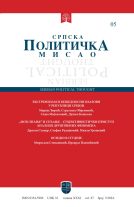- Home page
- Researchers
- Aleksandar Milošević
Aleksandar Milošević
University of Belgrade – Faculty of Political Sciences

FALLINGBEHIND: THE EUROPEAN UNION TRADE STRATEGIES FROM 1999 TO 2021
As one of the most important global trade actors, in the period that lasted from 1999 to 2021the European Union promoted five different trade strategies. Some of them, such as the strategy of “managed globalisation” (of 1999) and “Global Europe” (of 2006) represented a deviation from the previous trade practice, while others (“Trade, Growth and World Affairs” from 2010, “Trade, Growth and Development” of 2012, and “Trade for All” of 2015), for the most part, included significant improvements compared to previous strategic documents. The latest communication document of the European Commission, “Open, Sustainable and Assertive Trade Policy” (of 2021), points to the Union’s adaptation to new circumstances, emphasising the concept of open strategic autonomy and proclaiming a return to multilateralism based on fair and sustainable rules. Although the EU seeks to present itself as a leading initiator of change in the existing static trading system, this paper will attemptto prove that,in its strategic positioning and undertaken activities,the European Union is falling behind its key global competitors, the US and China. The systemic, state-centric and societal reasons for the relatively frequent changes of key trade documents and the essentially defensive action of the European Union in the global trade system will also be analysed.

The Economic Consequences of Mr. Trump
The paper analyzes Trump’s economic program. The overall impression is that this program echoes what has already been tried out during the Reagan era. In its philosophy it is reminiscent of Reagan’s “supply side” economics with its three major features: tax cuts and tax reform, massive deficit financing and finally, protectionism. Copying Reagan’s policies in a radically different environment in which the United States economy operates today is in itself dangerous. Considering that many economists see the Reagan economic legacy as highly flawed makes the perception of Trump’s proposals as even more risky. The belief that old policies can be used in situations that only superficially bear resemblance to past experiences is dangerous and leads to uncertainty and possible dire consequences for the global economy. This is even more accentuated with threats of tariff hikes, the scrapping of TPP and the renegotiation of NAFTA.
